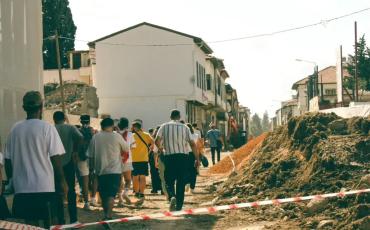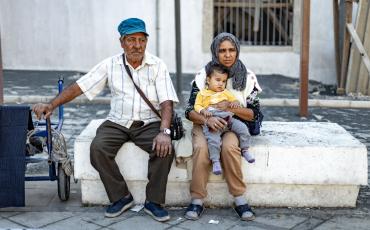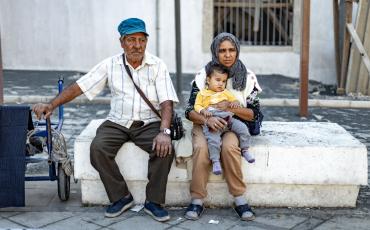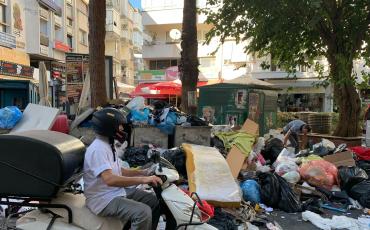In einer Atmosphäre von Unsicherheit und Gewalt fanden vergangene Woche Parlamentswahlen statt. Die AKP von Präsident Erdoğan hat dabei knapp 50 Prozent der Stimmen erhalten. Doch wie kam es zu diesem Ergebnis und was bedeutet es für die demokratische Entwicklung im Land? Von Ali Diskaya
This article is also available in English - please click here to read it.
Dem türkischen Präsidenten Recep Tayyip Erdoğan ist es gelungen, seine Macht entscheidend zu festigen. Bei den Parlamentswahlen am 1. November hat seine Partei Recht und Entwicklung, die unter der türkischen Abkürzung AKP bekannt ist, eine absolute Mehrheit erzielt. Dieses Ergebnis war nicht nur für viele Wahlforschungsinstitute überraschend. Es war auch ein großer Rückschlag für die Hoffnung auf demokratischen Wandel, der in breiten Teilen der Bevölkerung in den vergangenen Jahren entstanden ist.
In den zweiten Parlamentswahlen innerhalb von nur fünf Monaten haben 49,75 Prozent der Wahlbeteiligten für Erdoğans konservative, am Islam orientierte AKP 49,47 gestimmt. Die Volkspartei der Republik (CHP), ein mitte-links Bündnis, hat 25,3 Prozent, die rechte Nationale Aktionsfront (MHP) 11,9 Prozent und die linke, pro-Kurdische Demokratische Volkspartei (HDP) 10,75 Prozent erhalten.
Noch vor wenigen Monaten, nach den ersten Parlamentswahlen am 7. Juni, sah die Situation ganz anders aus. Damals hatte die AKP nur 40,9 Prozent erhalten und ihre Mehrheit verloren, die sie seit 2002 im Parlament besaß. Im Anschluss daran sah sich die AKP unfähig (oder war Unwillens) eine Koalition zu bilden. Stattdessen wurden Neuwahlen beschlossen, aus denen die Partei nun als Sieger hervorging.
Vor diesem Hintergrund drängen sich zwei Fragen auf: Wie ist es Erdoğans AKP in so kurzer Zeit gelungen, knapp zehn Prozentpunkte zuzulegen und rund fünf Millionen Wähler zu gewinnen? Und was bedeutet der wiederholte Wahlerfolg für die Chancen demokratischer und friedlicher Entwicklung in der Türkei?
Chaos säen, die Opposition beschuldigen und den Status quo ausnutzen
Bei den Wahlen im Juni begann der Schein von Unbesiegbarkeit zu bröckeln, den die AKP bis dato für sich beanspruchte. Zum ersten Mal in der Geschichte der Partei verlor sie ihre alleinige Mehrheit. Für viele AKP-Abgeordnete und Unterstützer war das ein großer Schlag. Sie begannen daraufhin umgehend, die HDP zu beschuldigen. Die Demokratische Volkspartei selbst hatte 13,1 Prozent erreicht, ein historisches Ergebnis, weil die Partei zum ersten Mal die Zehn-Prozent-Hürde erklimmen und dabei tatsächlich viele ehemalige AKP-Wähler gewinnen konnte.
Eine linke, pro-Kurdische Bewegung im Parlament beunruhigte die AKP. Aber Erdoğan wollte auch mit keiner anderen Partei koalieren, weil er dann seinen Plan hätte aufgeben müssen, die türkische Verfassung zu ändern und ein Präsidialsystem zu etablieren. Unter der Führung des Präsidenten sabotierten AKP-Politiker daher alle Koalitionsverhandlungen, um dadurch den Weg für Neuwahlen zu ebnen. Um die parlamentarische Mehrheit zurück zu gewinnen und die Aussichten für die HDP einzuschränken, stachelte die AKP den langwierigen Konflikt mit der verbotenen Kurdischen Arbeiterpartei (PKK) wieder an. Außerdem aktivierte die Regierung ihre weitreichende Propagandamaschinerie, um die HDP für die eskalierende Gewalt im Land zu beschuldigen.
Es begann am 20. Juli. In der Grenzstadt Suruç kamen bei einem Bombenanschlag 33 Menschen ums Leben. Die meisten von ihnen waren pro-Kurdische Aktivisten, die einer Vereinigung Sozialistischer Jugendverbände (SGDF) angehörten und auf dem Weg nach Kobanî waren, um dort beim Wiederaufbau eines Kinderspielplatzes zu helfen. Während die türkische Regierung den „Islamischen Staat“ (IS) für den Anschlag beschuldigte, hielten viele kurdische Aktivisten unterschiedlicher Parteien, darunter auch die HDP und PKK, der Regierung vor, Kurden dem IS-Terror auszuliefern, weil nichts dagegen unternommen wird. So deutete Selahattin Demirtaş, charismatischer Vizepräsident der HDP, in einer Pressemitteilung zudem an, dass Anschläge eines solchen Ausmaßes nur mit Unterstützung des Staates möglich seien. David L. Philipps, Professor an der Columbia University in New York, bestätigte diese Vermutung. Er fand Beweise, die belegen, dass die türkische Regierung mit dem IS kollaboriert. Dabei geht es von „militärischer Kooperation und Waffentransporten bis hin zu logistischer und finanzieller Unterstützung und medizinischen Diensten.“
Die PKK, die von der türkischen Regierung und vielen ihrer westlichen Partner als Terrororganisation eingestuft wird, schlug ihrerseits zurück und tötete zwei Polizisten. Die Luftwaffe und Sondereinheiten des türkischen Staates griffen daraufhin PKK-Posten in Südosten des Landes an, aber auch in Nordirak und Syrien. Als damit ein Waffenstillstand zum Ende kam, der immerhin zwei Jahre gehalten hatte, entspann sich eine neue Gewaltspirale. So wurde das Land in die 1990er Jahre zurückgeworfen, als ein Bürgerkrieg kurz bevor stand.
Ein frontaler Angriff
Anstatt de-eskalierend einzuwirken, wie es die HDP und viele andere Gruppen immer wieder versuchten, nutzte die AKP die Situation aus, indem sie den Konflikt weiter schürte und einen umfassenden Angriff auf die PKK startete. So verwandelte die türkische Regierung viele Städte im Südosten des Landes in ein Kriegsgebiet, verhängte Ausgangssperren und unterbrach Telefon-, Elektrizitäts- sowie Wasserleitungen. Weil außerdem ein (temporäres) Verbot von Beerdigungen verhängt wurde, musste die Bevölkerung die Opfer der Auseinandersetzungen zwischen den Sicherheitskräften und kurdischen Milizen mit Eis abkühlen, um sie vor der Verwesung zu bewahren. Einzelne Berichte deuten zudem darauf hin, dass Scharfschützen während der Ausgangssperre gezielt auf Zivilisten schossen. Zwar ist es schwierig, abschließend festzulegen, wer den Waffenstillstand zuerst gebrochen hat. Für viele Menschen in Diyarbakir oder Cizre steht aber fest, dass die Regierung die Kurden in der Region bestrafen will, weil sie ihr die Stimme enthalten.
Die Gewalt gegen die Kurden war jedoch nicht nur auf den Südosten der Türkei beschränkt. Befeuert durch die Propaganda der Regierung griff sie bald auch auf andere Landesteile über. Die AKP hat dabei die staatlich kontrollierten Medien geschickt auf Linie gebracht, um die PKK für das „Chaos“ und die eskalierende Gewalt zu beschuldigen. Auch hat sie – bar jeder Grundlage – versucht, die PKK mit der HDP gleichzusetzen, indem sie die HDP als politischen Arm der PKK bezeichnete. Die HDP selbst, oder tatsächlich alle anderen Organisationen und Bewegungen, hatten dabei keine Gelegenheit, dem offiziellen Diskurs entgegenzuwirken. Das hat schließlich auch dazu geführt, dass faschistische Mobs, die aus wütenden AKP und MHP Anhängern bestanden, zahlreiche HDP-Büros im ganzen Land angriffen, randalierten und in Brand setzten. Vereinzelt wurden Kurden auch einzeln angefallen und deren Geschäfte zerstört. Die Polizei hat dabei jeweils nicht eingegriffen oder ist gleich ganz weg geblieben.
Einen tragischen Höhepunkt erreichte die jüngste Gewalt am 10. Oktober, als in Ankara mindestens 97 Teilnehmer einer friedlichen Demonstration ums Leben kamen und 246 Menschen verletzt wurden. Zunächst bekannte sich niemand zu dem Bombenattentat. Die türkische Regierung allerdings zögerte keine Sekunde, um den IS, aber auch die PKK und den Revolutionäre Front zur Volksbefreiung (DHKP-C) zu beschuldigen. Einzelne AKP-Abgeordnete bezichtigten sogar die HDP, die aktiv zu der Demonstration aufgerufen hatte, die Bomben selbst gezündet zu haben, um Sympathie und Wählerstimmen aus der Opferrolle heraus zu gewinnen. Dabei spielt es am Ende fast gar keine Rolle mehr, wer das Attentat wirklich begannen hat – aufgrund der Propaganda der Regierung steht das Ergebnis für breite Teile der Bevölkerung ohnehin schon fest: Die oppositionellen Gruppen sind allesamt Terroristen, die das Land ins Chaos stürzen wollen.
In diesem Sinne war die AKP-Strategie, Gewalt anzustacheln und die weit verbreitete Angst anschließend für ihre Zwecke auszunutzen, leider ein voller Erfolg, auch in Hinblick auf die jüngsten Parlamentswahlen. Indem es die Auseinandersetzung mit der PKK im Anschluss an das Attentat von Suruç anfeuerte, konnte die AKP sich bei rechten Wählern profilieren und Stimmen von der nationalistischen MHP gewinnen. Ein politischer Analyst beschrieb es wie folgt: „Türkische Nationalisten wissen ganz genau, dass Erdoğan als einziger stark genug ist, kurdisches Blut zum Fließen zu bringen. Für sie bedeutet ein geschwächter Erdoğan ein geschwächter Staat, was der PKK in die Hände spielen würde. Aus diesem Grund haben sich viele Nationalisten dafür eingesetzt, Erdoğan zu bemächtigen, um kurdische Dissidenten weiter zu unterdrücken.“ Indem die HDP mit der PKK gleichgesetzt wurde (oder zumindest in Verbindung gebracht wird), hat die AKP außerdem auch Stimmen der konservativen Kurden gewonnen, die sich von ihrem Bekenntnis zum türkischen Staat Stabilität versprechen.
Die Chancen demokratischer und friedlicher Entwicklung
Der bekannte Politikwissenschaftler und Journalist Fareed Zakaria hat 1997 das Konzept der „illiberalen Demokratie“ eingeführt. Dabei geht es um ein Regierungssystem, dass weder einer liberalen Demokratie noch einer Autokratie entspricht, sondern Elemente beider Systeme aufweist. Illiberale Demokratien, so Zakaria, sehen nach außen vielleicht wie Demokratien aus, weil regelmäßig gewählt wird, es unterschiedliche Parteien und eine mehr oder minder unabhängige Justiz gibt. Aber das bedeutet noch lange nicht, dass demokratische Prinzipien den Umgang mit der Bevölkerung bestimmen, wenn zum Beispiel bestimmte Freiheitsrechte wie das Recht auf freie Meinungsäußerung und Versammlung beschnitten werden. In illiberalen Demokratien werden die Medien zudem häufig durch den Staat oder die Regierung bestimmt. Manche Regime gehen auch gewalttätig gegen Kritiker vor, was die Opposition gegen illiberale Demokratien insgesamt sehr schwer macht.
In den vergangenen Jahren, und insbesondere in den letzten fünf Monaten, hat die AKP-Regierung zunehmend autoritäre Tendenzen entwickelt. Die Türkei entspricht daher am ehesten einer illiberalen Demokratie: Die AKP hat das Ergebnis der Parlamentswahlen vom 7. Juni nicht akzeptiert. Stattdessen hat die Regierung den Konflikt mit der PKK wieder angefacht und die staatlich kontrollierten Medien mobilisiert, um die HDP für die Gewalt verantwortlich zu machen. Währenddessen werden Social Media Seiten weiter beschnitten, bleibt Youtube gesperrt, werden pro-kurdische Aktivisten wie auch türkische und ausländische Journalisten eingesperrt, und zahlreiche Redaktionen, die kritisch über die Regierung berichteten, untersucht.
Der bekannte US-Aktivist und Linguist Noam Chomsky hat in einem Interview jüngst argumentiert, dass die EU Schuld an den autoritären Entwicklungen in der Türkei sei, weil sie den Beitritt des Landes zur Union aufschieben und behindern würde. Das Argument ist plausibel. Es gibt sicherlich viele externe Faktoren wie die Außenpolitik der EU gegenüber der Türkei, die die autoritären Tendenzen Erdoğans und seiner Regierung wenn nicht direkt befördern, so sich doch zumindest damit abfinden und sie so implizit bestätigen.
Aber die eigentliche Krux ist, dass die Mehrheit der türkischen Bevölkerung die Politik der Regierung mit ihren Stimmen belohnt. Angefeuert durch diese Unterstützung wird die AKP unter Erdoğan wohl auch in den nächsten Jahren weiter autoritär regieren; Hoffnung auf Besserung durch Mäßigung gibt es kaum. So plant Erdoğan bereits, die Verfassung nun endlich umschreiben zu können, um ein Präsidialsystem à la Putin einzuführen, was ihm weitreichende exekutive Befugnisse einräumen und seine Macht auf viele Jahre bestätigen würde.
Doch die politische Entwicklung des Landes ist keine Einbahnstraße. Die Mehrheit der Bevölkerung mag zwar die autoritäre Politik der Regierung belohnt haben. Dafür hat die Regierung ihrerseits insbesondere nationalistischen Bevölkerungsgruppen signalisiert, dass es „in Ordnung“ ist und scheinbar sogar notwendig, Kurden anzugreifen, ihre Geschäfte zu zerstören und ihre toten Körper durch die Straßen des Landes zu schleifen wann immer Kritik und Dissens geäußert werden. Ergebnis dieser symbiotischen Beziehung zwischen dem Staat und Teilen der Bevölkerung ist die herrschsüchtige Ermächtigung der AKP-Regierung. Gleichzeitig nimmt die Polarisierung in der Gesellschaft entlang ethnischer Unterscheidungen zu, wohlgemerkt ein politischer, nicht etwa ein natürlicher Prozess. Beide Tendenzen, sofern sie nicht eingeschränkt und umgekehrt werden, könnten das Land in einen Bürgerkrieg führen.
---------------------------------------------------------------------------------------------------------------------------------------------
Illiberal democracy continued in Turkey
In a climate of chaos and violence, Erdoğan’s AKP party managed to return to power by securing nearly 50 percent of the vote in last week’s snap parliamentary elections. How did the AKP achieve this remarkable result and what does it mean for the prospects of democracy and peace in Turkey? By Ali Diskaya
Turkey’s President Recep Tayyip Erdoğan has managed to decisively tighten his grip on power. His ruling Justice and Development Party (known by its Turkish acronym AKP) has swept an absolute majority victory in national elections on November 1. This was not only a surprise to all major polling companies, but also a blow to the aspiration for democratic change that had built up in wide segments of the population.
In the second parliamentary election in five months, Erdoğan’s conservative, Islamic-leaning AKP party won 49.47 percent of the vote. The center-left Republican People’s Party (CHP) gained 25.3 percent, the far-right Nationalist Action Party (MHP) 11.9 percent and the left-wing, pro-Kurdish Peoples’ Democratic Party (HDP) 10.75 percent.
Only a few months ago, after this year’s first parliamentary election held on June 7, the situation had looked very different. Back then, the AKP received just 40.9 percent of the vote and lost the majority it had enjoyed since coming to power in 2002. Unable (or unwilling) to form a coalition government, the AKP then announced snap elections on November 1, from which it now emerged victorious.
At this moment, the key questions that need to be asked are twofold: How did Erdoğan’s AKP party manage to gain nearly ten percent or approximately five million more votes in only five months? And what does its (continued) electoral success mean for the prospects of democracy and peace in Turkey?
Sow chaos, blame it on your opponents, and reap the status quo
After the June elections, the AKP for once and for all lost the appearance of invincibility within Turkish society. For the first time in the party’s history, it lost its single-party majority in the Turkish parliament. In this moment of paralysis, AKP politicians and supporters were quick to blame the HDP. Indeed, the Peoples’ Democratic Party gained an unprecedented 13.1 percent of votes, largely at the expense of the AKP, and managed for the first time to cross the 10-percent threshold required to enter parliament.
A left-wing, pro-Kurdish party entering parliament troubled the AKP. But it was not interested in cooperating with any other party either, because it would then have to give up its plan of changing the Turkish Constitution. Accordingly, AKP politicians, with Erdoğan leading the way, sabotaged talks with potential coalition partners in order to clear the way for snap elections in November. To regain majority in parliament and delimit the electoral chances for the HDP, the AKP government subsequently reignited the decades-old conflict with the outlawed Kurdistan Workers’ Party (PKK) and mobilized its vast propaganda machinery to blame the chaos and escalating violence in the country (partly) on the HDP.
It all started on July 20 when a horrific blast in the border town of Suruç killed 33 people. Most of them were pro-Kurdish activists from the Socialist Federation of Youth Associations (SGDF) who planned to cross into the Kurdish city of Kobanî to take part in the building of a children’s playground. While the Turkish government blamed the attack on the terror organization “Islamic State” (IS), Kurdish activists from various parties and organizations, including the HDP and the PKK, accused the AKP government for turning a blind eye to IS attacks against Kurds. In a press statement, Selahattin Demirtaş, charismatic co-leader of the HDP, even implied that such an attack could only be carried out with “support from within the state”. Indeed, Columbia University professor David L. Phillips has recently confirmed these allegations. He found ample evidence that shows that Turkey is actively collaborating with IS on a number of issues, ranging “from military cooperation and weapons transfers to logistical support, financial assistance, and the provision of medical services”.
The PKK, considered a terrorist organization by the government and many Western powers, then carried out a retaliatory attack against two Turkish police officers. In return, the Turkish air and special forces struck PKK positions in Turkey, Northern Iraq and Syria. This effectively ended a two-year-old cease-fire between the government and the PKK and started a new spiral of violence that brought the nation back to the 1990s, when it stood on the brink of civil war.
A full-scale assault
Instead of trying to deescalate the situation, as the HDP and other groups repeatedly tried to do, the AKP government used the momentum to intensify the conflict and start a full-scale assault on PKK positions in the predominantly Kurdish southeast of Turkey. Indeed, the Turkish state turned many major cities in the region into war zones, where it imposed day-long curfews and cut off phone, electricity and water services. Since the government also banned burials in these cities, people had to put ice on the corpses of civilians caught in the crossfire between security forces and Kurdish militants to stop them putrefying. Some reports also point to the fact that snipers were deliberately shooting at Kurdish civilians during the curfews. And while it is difficult to say who initially violated the cease-fire, most people in places like Diyarbakir or Cizre blame the AKP government for escalating the conflict and taking revenge on the Kurds because they did not vote for them.
But the violence against Kurds was not only limited to the southeast of Turkey. Driven by intense government propaganda, it soon swept over to other parts of the country as well. The AKP effectively mobilized state-controlled media not only to blame the chaos and escalating violence in the country on the PKK. It also sought, however wrongly, to link and even equate the PKK with the HDP, arguing that it is the political arm of the PKK. For its part, the HDP – or any other actor for that matter – had no chance to counter the state’s dominant discourse. As a result, fascist mobs consisting of angry supporters of the AKP and MHP recently rampaged and firebombed hundreds of HDP offices throughout the country, started lynching Kurds and burning their shops while Turkish security forces stood by and looked the other way.
Events reached a tragic climax on October 10 when two explosions at a peace rally in Ankara killed at least 97 people and left 246 wounded. Initially, no one claimed responsibility for the bombings. Nevertheless, the Turkish government contended that only groups like IS, PKK and the far-left Revolutionary People's Liberation Party-Front (DHKP-C) are capable of carrying out such an attack. Some AKP members even implied that the HDP, one of the groups that called for the peace rally, bombed its own people to gain sympathy and votes. Yet, at the end, it did not really matter which group actually carried out the attacks – as a result of powerful government propaganda, they were all made into essentially the same for the Turkish public: terrorist organizations that want to throw the country into chaos.
In this sense, the AKP’s strategy of sowing violence and exploiting fears of chaos across Turkey was a total success, indeed key for winning the recent snap elections. By resuming the war with the PKK shortly after the Suruç bombing, the AKP managed to steal a bulk of nationalist right-wing votes from the MHP. While many nationalist voters refused to vote for the AKP in June, they switched back simply because of their hatred for the Kurds in general, and for the PKK in particular. As one political analyst recently put it: “[Turkish] nationalists know too well that Erdoğan is the only man capable of truly shedding the blood of the Kurds. A weak Erdoğan means a weakened state, which would play into the hands of the PKK. For this reason, nationalists have presented Erdoğan with a strong mandate to continue his suppression of Kurdish dissidents”. Furthermore, by successfully equating (or at least linking) the HDP with the PKK and (partly) blaming it for the escalating violence in the country, the AKP managed to win back votes among the more conservative segment of Kurdish society, which at June elections had turned its back on AKP in favor of the HDP.
The prospects for democracy and peace in Turkey after the elections
In 1997, renowned political scientist and journalist Fareed Zakaria introduced the concept of “illiberal democracy”. This refers to governing systems that are neither fully-fledged liberal democracies nor autocracies, but that combine elements of both systems. Illiberal democracies, Zakaria argued, might look like democracies from the outset (with regular elections, a range of different parties, a judiciary etc.). But this does not necessarily mean that they will act like one with regard to their interaction with citizens, stripping them off of civil liberties such as the freedom of speech or the freedom of assembly. In illiberal democracies media are often controlled by the state and support the ruling regime. Some regimes might also use violence or imprisonment against critics. All these factors make opposition against the ruling regime extremely difficult in illiberal democracies.
Considering the increasingly authoritarian tendencies of the AKP government in the last couple of years in general, and the explosion of events in the last five to six months in particular, Turkey might indeed be best described as an illiberal democracy. The AKP did not accept the results of free elections held on June 7. The government reignited and fuelled the conflict with the PKK and mobilized state-controlled media to blame the chaos and escalating violence in the country (partly) on its main opponent, the HDP. What is more, social media outlets were banned in Turkey, hundreds of pro-Kurdish activists as well as local and foreign journalists imprisoned, and countless newspaper offices that had a critical stance towards the president or the government were raided.
In a recent interview, prominent U.S. activist and linguist Noam Chomsky argues that events in Turkey may have been triggered by the unwillingness of the European Union (EU) to further the accession of the country, leading Erdoğan instead to choose more authoritarian paths. To be sure, there are a number of external factors like the EU’s foreign policy towards Turkey that if not directly contribute, at least accommodate to the AKP government becoming more authoritarian. But the real problem lies in the fact that the majority of the Turkish public is rewarding the government’s behavior at the ballot box. Encouraged by such domestic approval, the AKP government will continue to walk even further down the authoritarian path in the years to come. Indeed, Erdoğan already plans to change the Turkish Constitution and turn the state over to a Putinesque presidential system, which would grant him more executive powers and perpetuate his rule for the unforeseeable future.
It is important to note, however, that this process is not a one way street: Indeed, the majority of the Turks approved and rewarded the authoritarian practices of the AKP government. But the government, for its part, signaled to large nationalist segments of the Turkish society that it is acceptable, even allegedly necessary to kill Kurds, burn their shops and drag their deceased bodies through Turkey’s streets whenever they show signs of dissent. As a result of this symbiotic relationship between state and society, the ruling AKP regime is indeed becoming increasingly authoritarian. At the same time, the society becomes more and more divided and polarized along ethnic lines. Both developments, if not countered and reversed, could lead the country into a full scale civil war.






















